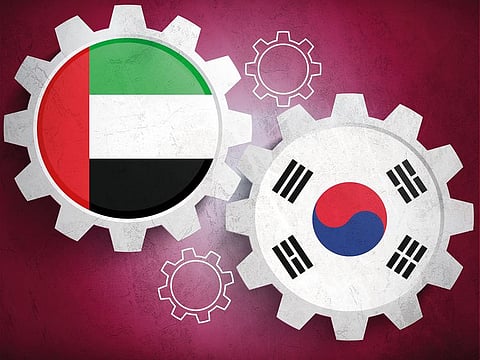UAE, South Korea: Innovative middle powers
The partnership between the two countries is based on special, smart and strategic goals

Given the wide-spectrum collaboration over four decades, UAE-South Korea relations could be summarised as special, smart and strategic.
The now traditional annual visit of South Korean presidents to the UAE in January to coincide with the Abu Dhabi Sustainable Summit is another opportunity to not just maintain the current momentum but to find new channels to bolster this partnership.
South Korea has scripted an unprecedented economic success story after the humiliation and suffering under colonial rule and the ruins of the Korean War. Its industrious people have transformed a poor country into an innovative powerhouse.
The UAE’s transformation from camels to cosmos is a story in itself too.
Unparalleled partnerships
This coming of age and interplay between the “miracle of the desert” and “miracle of the Han River” have nurtured unparalleled partnerships.
Along with energy, engineering and construction sectors also thrived before diversifying into the renewable energy, technology, healthcare, logistics, and even space and defence arenas. Combining these make them rising middle powers who focus on four Cs – capital, commerce, connectivity, and collaboration – and add dynamism to a multipolar world.
It is common to highlight South Korea building UAE’s nuclear plants to showcase their past association. Their present enterprise is evident in the UAE being South Korea’s largest trading partner in the Arab world. Their future potential lies in their aim of doubling trade to $20 billion in five years, alongside othercollaborations.
While South Korea needs the UAE’s energy supplies for sustained growth, the UAE’s pursuit to “celebrate” the shipping of the last oil barrel would require South Korea’s experience of developing a knowledge economy, thus making it a symbiotic involvement.
Past-present-future link
The two nations elevated their association to the ‘Special Strategic Partnership’ level in 2018. South Korea has no such arrangement with any other Middle East nation. A peek into some bilateral developments in 2022 reinforces their past-present-future link.
ADNOC and GS Energy have partnered to further Abu Dhabi’s hydrogen economy and carrier fuel exports. The UAE exports about 10% of South Korea’s crude requirements. Reflecting complementarity, South Korean companies are stakeholders in Abu Dhabi’s upstream concessions.
Three South Korean companies are part of a $1 billion plan to build a green hydrogen and ammonia production plant in the UAE. Etihad Credit Insuranceand Korea Trade Insurance Corporation are investing in sustainable energy.
Similarly, Masdar and KEPCO are assessing opportunities in offshore wind energy and battery storage technologies. These are timely since the UAE is hosting COP28 this year and South Korea is targetting COP33 in 2028, and both countries have committed to net-zero emissions by 2050.
Strengthening of SMEs
To strengthen small and medium enterprises, they are developing partnerships in health technology and smart agriculture, among others. These are crucial components of the UAE’s ‘Projects of the 50’ focussing on trade, entrepreneurship, advanced skills, digital business, space, and advanced technologies.
To support these initiatives, negotiations are underway for the Comprehensive Economic Partnership Agreement, thus creating investment opportunities.
Etisalat and Bespin Global have joined hands to provide public cloud services for the Middle East, Africa and South Asian countries. There are also endeavours in logistics and life sciences and biotechnology industries. In the healthcare sector, nearly half the Middle Eastern patients treated in South Korea are Emiratis.
In diplomacy, South Korea’s experience in dealing with North Korea offers a sounding board for the UAE’s pursuit of a ‘zero problems’ foreign policy in its neighbourhood. Navigating superpower rivalry is another dimension that both could exchange notes on. Further, as part of space diplomacy, Seoul has helped develop DubaiSat-1 DubaiSat-2 and KhalifaSat.
Largest defence contracts
In the defence sector, Seoul and Abu Dhabi signed in 2022 a landmark $3.5 billion deal, considered to be among the largest defence contracts in South Korea’s arms exports history. This includes KM-SAM surface-to-air-missiles, which makes the UAE the first foreign country to use it.
The UAE has expressed interest in T-50 trainer jet, KF-21 fighter, light-armed helicopter, and the next-generation helicopter satellite system. This indicates that the annual defence ministerial talks since 2011, which facilitated the ‘Akh’ force deployment in the UAE, are yielding results. In addition, South Korea hasexpanded its anti-piracy naval operation to include Gulf waters. These gel well with the UAE’s security diversification policies.
In the cultural domain, “with K-drama, K-beauty, Korean fried chicken,” and K-pop, the “Korean wave”continues to surge in the UAE.
Moving forward, the rising middle powers could consider three ideas: one, expand bilateral ties and incubate minilateral partnerships with likeminded partners to face challenges of the new world (dis)order; two, explore new collaborative fields like ‘blue economy’, which combines energy, trade, technology, food, infrastructure, and logistics; and three, experiment with a three-plus-three format involving the economy, foreign and defence ministers of both countries for better coordination of these strategic sectors.
Dr N. Janardhan is a senior research fellow at the Anwar Gargash Diplomatic Academy, Abu Dhabi, and non-resident fellow at the Arab Gulf States Institute in Washington. Dr Hyondo Park is a professor at the Sogang Euro-Mena Institute, Sogang University, Seoul.


